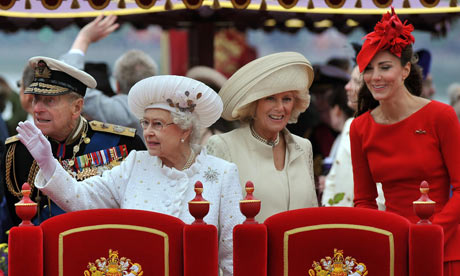
'The Great British Summer' of 2012 is well and truly over. OurKingdom takes a rollercoaster journey back through the season to close its series.
This piece ends the OurKingdom series, The Great British Summer?
The Great British Summer of 2012. Will it go down in history by that name? For so it was 'sold' or 'offered' to the British public and the world (which term is most fitting is a key question for this series).
In these months, we were told, Britain would reinvent itself. The giants of the Olympics and Paralympics straddled the season, but this was also, following the Spring of the Royal Wedding, the summer of the Queen's Diamond Jubilee and - sandwiched in amongst them like cucumber in white sliced bread (or is it now organic multi-seed) - the Wimbledon Tennis Championships and the Proms (their red-faced pomposity hiding a radical heart, as this piece argued).

OurKingdom spent the season challenging the official narrative of these events - scrapping the sandwich for a start, and calling for haggis pakora. We opened the series by asking a question: Who owns the Great British Summer? If the people, which public(s)? Is it British? And can we really call it ‘Great’?
Responses abounded. Contributors dug deep into the finances of the London 2012 Games, baring the grim underbelly of the ‘world's biggest party’ as a flagship project in the transfer of power from the British state to the private sector. OurKingdom was the first UK publication to track G4S (including a widely read scoop), and with the security giant's failure to deliver their Olympics contract, their abuses were finally in the spotlight. Who was called on to fix the mess? The army – doing much, as Vron Ware explored, to further the military’s plans for greater integration into British civil society.
And while we investigated who owned the festivities (and festival culture itself), our regular contributor to the series Mark Perryman proposed lively but pratical solutions as to how the Games could touch more lives through increased participation. But remember, there were rules on participation. A defender of the commons compared the ‘people’s Jubilee’ – the very image of the Queen’s face is public property to lovingly paint or defile – to LOCOG owning the ‘rights’ to Team GB.

Meanwhile, what was happening to the 500 acres of land enclosed by a towering security fence, home of the Olympic Village? Anna Minton and Phil Cohen explored the dreams and nightmares of the newly created postcode E20, housing both a promised utopia and dystopian threats to our liberty. And the Olympic 'zone' did not end there, as we discovered from one of the peaceful protesters arrested several miles from the Opening Ceremony as part of the cyclist group Critical Mass.
Over this, the project of ‘modern Britishness’ loomed. The stable, timeless Anglo-Britishness ushered in by Queen Elizabeth’s Thames Royal Flotilla was deconstructed, we asked what Scotland thought - then it was blown apart by Danny Boyle's Olympics Opening Ceremony. Was this a new modern Britishness being born? A radical challenge to neoliberalism as Anthony Barnett argued, or a fanciful assertion of 'national identity' that belongs on the scrap heap?

Our closing event to end the series, at East London's Cafe Oto, invited Henry Porter, Dan Hancox, Vron Ware and Suzanne Moore to help us pin down the spirit unleashed by the summer, in an open public discussion in which Moore's attack on the “miserabilist left” was an implicit challenge to the series. We discussed legacy. Would the Great British Summer be remembered as a season of festivity that gave the Union a new sense of confidence and identity? A successful testing ground for experiments in security weaponry, the changing role of the armed forced and the suppression of dissent? Or as a seismic shift in perceptions of the physically disabled?
The Great British Summer has yet to produce its legacy. While it does, this series will remain here as a resource. We may re-awaken it as more is revealed.